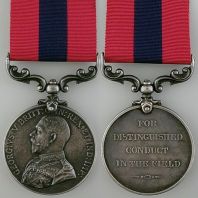Squadron Corporal Major 2048 George
Attenborough DCM
George was born to Frank and
Charlotte Jenny Attenborough at Steeple in March 1879
Although he was always
referred to as George he was named as John George Attenborough
His father died in 1884
leaving his mother to bring up George although she remarried later
George joined 1st
Life Guards, aged 19, on 20 April 1898 and trained as a trooper.
He fought with the life guards
in the Boer war and at the conclusion was awarded the Queens South
Africa Medal with clasps to represent his presence at the campaigns
of Relief of Kimberley, Paardenberg, Driefontein,
Johannesburg and Wittenbergen.
When the Great War began in
1914, George was by now a Corporal and went straight to war as the
Life Guards were amongst the first units to be involved in the
fighting.
In November 1914 the German
attack had slowed and trench warfare had begun.
George wrote a letter home
about his experience.
The night before last, 64
of us were lining 400 yards of trenches near Ypres. We heard the
Germans singing hymns and so we knew that they were about to attack.
At 12.30 they made a terrific rush giving a mighty cheer and
succeeded in getting into our trenches. We then went for them with
all that we were worth ( 64 against hundreds) and the result of it
all was that we lost 5 killed and 15 wounded and I counted 50 to 60
dead Germans in our trenches besides taking 19 prisoners. There were
dozens shot before the succeeded in getting into our trenches.
On 5 August 1915 he was
awarded a Distinguished Conduct Medal, which is second only to a
Victoria Cross for his actions at Ypres. The citation reads :-
For conspicuous gallantry
and devotion to duty on 13 May 1915 near Ypres when he remained in
shell holes under heavy fire during a retirement and ultimately
advanced with the 10th Hussars in a
counter attack
 DCM
DCM
In March 1918 on home leave
George married Jenny Ada Kelly and the couple moved to Hazeldene,
Western Road, Burnham on Crouch.
Shortly after his wedding
George returned to duties with D Squadron 1st Life Guards
On 19 May 1918 George suffered
wounds which were serious enough for him to be repatriated to the 3rd
London General Hospital at Wandsworth where he died on 1 July 1918
from the wounds received.
He is buried at Burnham on
Crouch Cemetery.
His mother died on 10 January
1919 and from accounts the cause of death was attributed to the news
of the death of her son.



